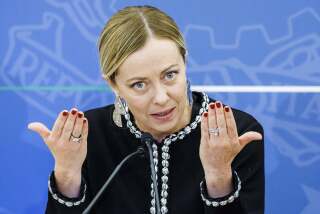Greek financial crisis spurs political discord
Greek Prime Minister George Papandreou faced a political rebellion Thursday when two of his Socialist party lawmakers resigned and a clutch of others challenged his leadership as the country teeters on the verge of financial collapse.
Though the resignations — which followed another defection by a Socialist lawmaker this week — did not end the party’s majority in the Parliament, the crisis upstaged Papandreou’s vow to overhaul his Cabinet in the midst of swelling social unrest and violent protests against deep budget cuts.
Papandreou held an emergency meeting with Socialist party members, saying the nation’s future depended on them.
“I know these measures are painful. But the fate of the nation rests in your hands,” he said. “It’s high time we all take responsibility for our actions. I will forge ahead … and continue to seek consensus.”
The government is seeking Parliament’s approval for an austerity package that includes tax hikes, deep cuts in public-sector wages and the sale of various state assets.
On Wednesday, thousands of people protested, some violently, in Athens, the Greek capital, and pushed the government to the brink of collapse, triggering a dramatic offer by the prime minister to resign in favor of a national unity government.
Conservative opponents rejected the proposal, insisting instead on the renegotiation of a $146-billion bailout package that the European Union and the International Monetary Union patched together last May to stave off Greece’s default. Should Papandreou be forced to step down after less than two years in office, he would be one of the shortest-serving prime ministers in Greece’s turbulent political history.
The political stalemate, after months of anemic reforms and poor fiscal performance because of a deeper-than-expected recession, has heightened financial market concerns over the government’s capacity to service its near $400-billion debt.
World stocks also drooped to a three-month low Thursday and the euro slumped to a one-month record.
Unable to access international markets for extra funding, Greece is seeking additional bailout funds — at least $100 billion more — from its international lenders in exchange for the brutal budget cuts.
Though European leaders are unlikely to let Greece collapse, Germany, the European Union’s paymaster, and the union’s central bank are still at odds over whether private creditors with vaults full of Greek bonds should share the burden of the bailout.
Eurozone finance ministers have called for an urgent meeting Sunday to come up with a new deal on the Greek debt. It remained unclear whether Greek Finance Minister George Papaconstantinou, the main architect of the unpopular austerity package, would attend. Senior government officials suggested Thursday that the prime minister may dismiss Papaconstantinou to rein in dissent and defuse anger or disillusionment with the government.
With the unemployment rate surging to more than 16% and recession deepening across the country, the Socialist party has seen its support levels plummet to 27%. Papandreou’s popularity also has taken a dive in recent months because of a widespread perception of political disarray and lack of direction in the government.
“This is just the start of a long and painful process,” said Alastair Newton, a senior political analyst at Nomura International. “Even if Papandreou succeeds in pushing through these new austerity reforms, many more challenges lie ahead.”
Carassava is a special correspondent.
More to Read
Start your day right
Sign up for Essential California for news, features and recommendations from the L.A. Times and beyond in your inbox six days a week.
You may occasionally receive promotional content from the Los Angeles Times.






